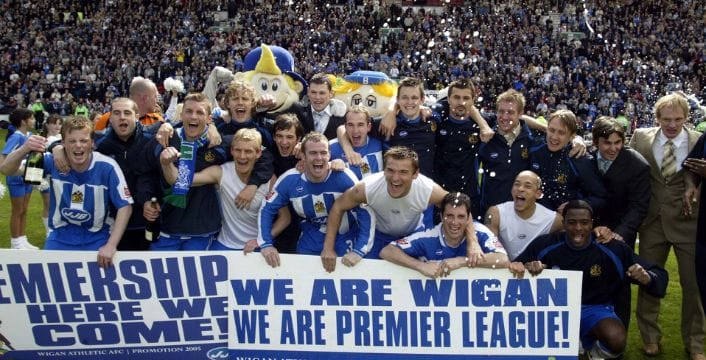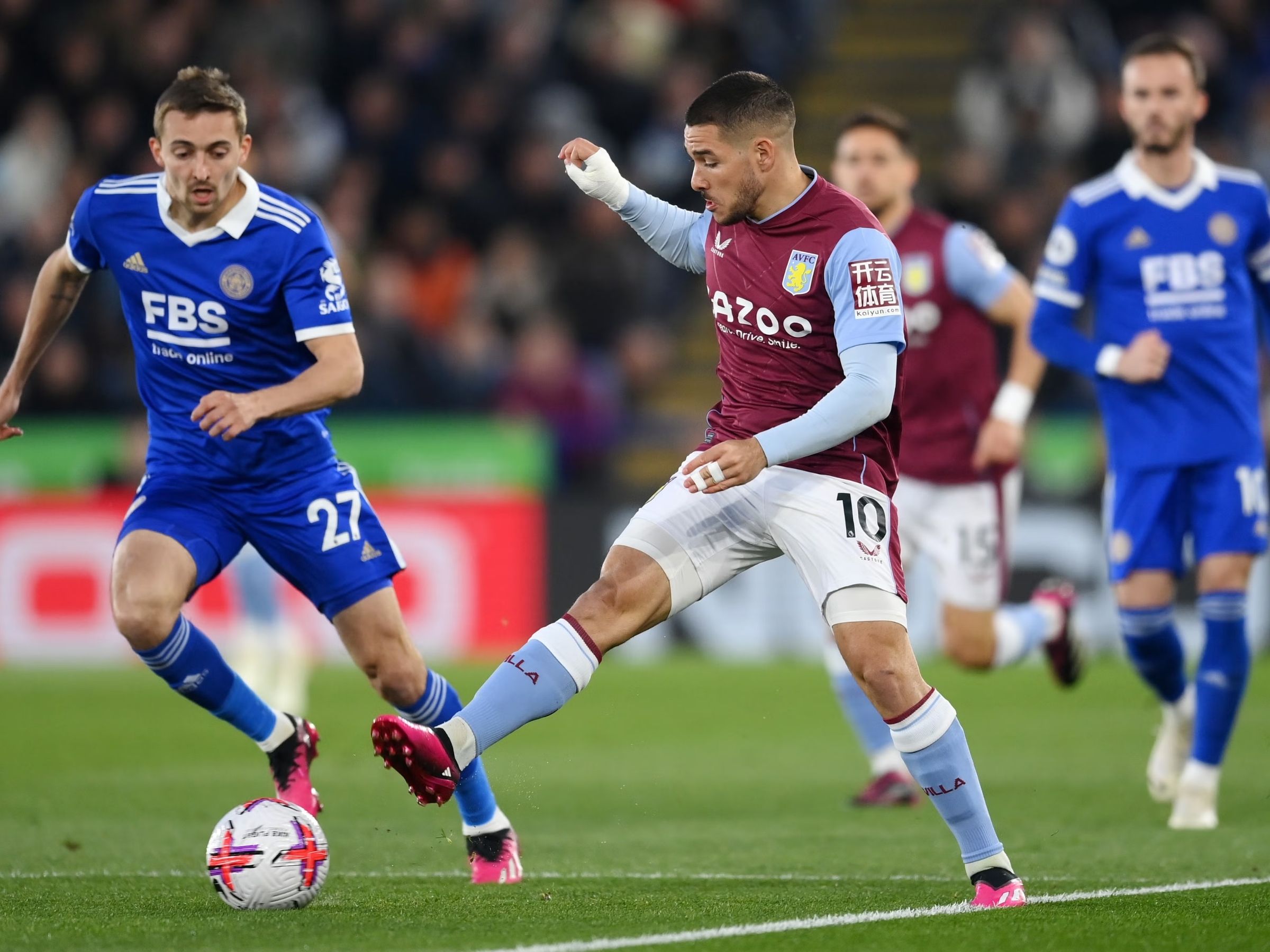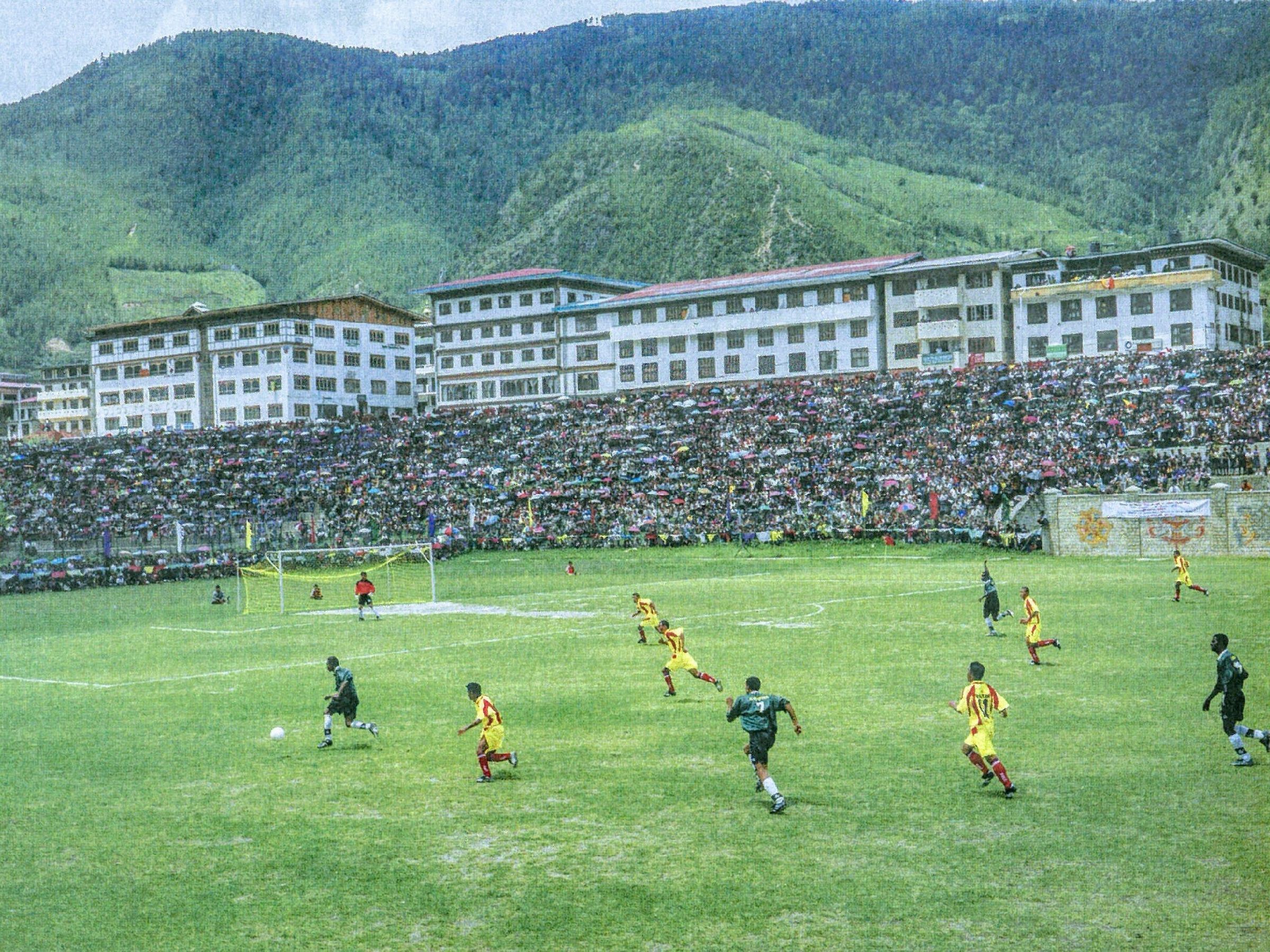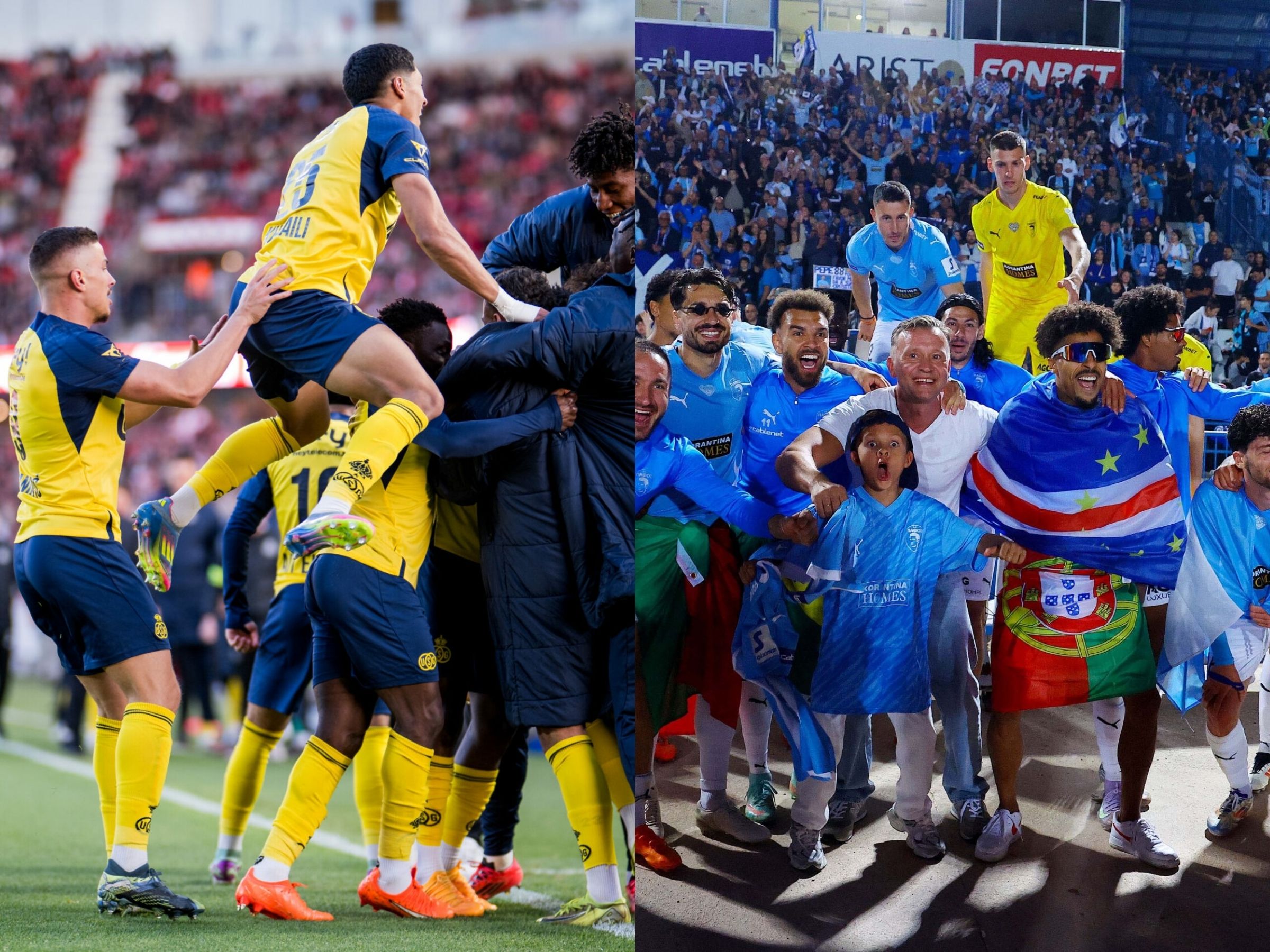Imagine standing on the brink of losing your dream job, only to pull off an extraordinary achievement that cements your legacy as a hero. Yet, despite your success, the outcome remains the same—you lose the job. This paradoxical scenario mirrors what happened to Wigan Athletic during the 2012/13 season.
In a historic turn of events, Wigan Athletic won the FA Cup, making an indelible mark on English football. However, in the same season, they faced the bitter reality of relegation from the Premier League—a first in the history of English football.
They descended to the Championship, but their stunning FA Cup triumph also earned them a place in European football, crafting a story that is as remarkable as it is unusual. This is the tale of a season that encapsulated both triumph and heartbreak, a bittersweet chapter in Wigan Athletic’s history.
From the Brink of Bankruptcy to Premier League Dreams
Three decades ago, Wigan Athletic was far from being seen as a Premier League club. In 1995, the club teetered on the brink of bankruptcy, struggling at the bottom of the English football league pyramid. For their fans, being a lower division club was already an improvement from their modest history in the non-league system.
Then came Dave Whelan, a former footballer who had spent his career with Blackburn Rovers and Crewe Alexandra. After retiring from the sport, Whelan built a successful business empire, amassing a fortune that eventually grew to $230 million, making him one of the wealthiest figures in British football.
In 1995, Whelan purchased Wigan Athletic and made a bold promise to the fans: he would elevate the club to the Premier League within a decade. Such promises from affluent new owners are often met with skepticism, as many have made similar assurances only to fail spectacularly. However, Whelan was different—he delivered on his promise.
The Journey to the Top
In 2003, Wigan Athletic found its way to the Championship, the second tier of English football. They finished seventh, just one spot shy of the playoff positions that could have granted them a chance to reach the Premier League. Although it was a disappointment, there was a sense of pride around Robin Park, as the club had never come so close to achieving such a milestone.
Then, the very next season, Wigan made history. Finishing second in the Championship secured their place in the Premier League, fulfilling Whelan’s promise and adding a new chapter to Wigan’s nearly 75-year history. The city was filled with joy. This was their greatest achievement, but in the back of his mind, Whelan was already focused on the next challenge—staying in the top division.

Wigan did not have a great team, but its team was filled with cult-heroes loved by the club and its fans – Leighton Baines, Jimmy Bullard, and Henri Camara. And while not many gave them hope of staying up when the 2005/2006 season started, their start to the year winning eight out of their opening eleven games shut those talks up.
They faltered a bit in the later rounds, but that golden run early into the season made sure that their primary objective of avoiding a trip back to the Championship was avoided. Wigan finished 10th, and there was optimism of bigger and better things to come. Little did they know that was about as good as it would get.
Years of Instability
Things weren’t as ominous – at least in the near future – as the ending to that last paragraph sounded. Wigan managed to establish itself as a Premier League club for the time being, surviving relegation year after year, sometimes by the skin of their teeth. After their 10th place finish, Wigan finished 17th the very next season, just one place above the drop zone.
In subsequent years, they finished 14th, 11th, 16th, 16th, and then, 15th. It was nothing extraordinary, but they were doing what had to be done to survive in what is arguably the most difficult league in the world.
But why was there no progress? Clubs who had been in the Premier League for so long – and were being run well – usually made bigger strides, at-least a sniff of the European places. But for Wigan, it was a problem because they constantly kept selling their star players, without replacing them with anyone as good.
Wigan was very active in the transfer market between 2007 and 2013, with 39 arrivals in the club, and while that could be seen as a good sign by some, in reality, it reeked instability and indecisiveness when it came to choosing a core group of players. As such, 61 people departed the club in that same duration.
Wigan also brought in a strong manager, Roberto Martinez, in 2009, despite interest from Aston Villa and Liverpool. Martinez joined with the hope of steering the club in a new direction. However, he faced the constant challenge of losing key players, who later went on to thrive at bigger clubs—Leighton Baines, Antonio Valencia, and Wilson Palacios, to name a few.
The 2012/13 Season: A Fatal Blow
The 2012/13 season finally dealt a fatal blow to Wigan, proving they could no longer operate as they had over the previous seven years. They struggled throughout the campaign, managing just five wins by the halfway point. Despite a late push for survival, the club found itself on the brink of disaster, facing the daunting task of winning away at Arsenal to secure their Premier League status.
Interestingly, just before that crucial game, Wigan had an FA Cup final to play—a welcome distraction from the looming threat of relegation. Their FA Cup journey had largely flown under the radar, as few expected them to progress so far. However, when they reached Wembley for the semi-finals, it caught many by surprise. Their path to the semis had seen them overcome Bournemouth, Macclesfield, Huddersfield, and Everton.
A 2-0 victory over Millwall in the semi-finals secured Wigan a place in the final against Manchester City on May 11, 2013. The City side they were set to face was formidable, featuring stars like Sergio Aguero, David Silva, Vincent Kompany, Yaya Toure, and Samir Nasri.
A Welcome Distraction: The FA Cup Journey
Wigan’s game plan heading into the FA Cup final was simple. Roberto Martinez deviated from his usual patient build-up and possession-based approach, opting instead for a pragmatic strategy—defending deep and absorbing pressure. The players were resilient, and despite Manchester City’s relentless attacks, they couldn’t find the back of the net. Callum McManaman, a product of Wigan’s academy, was a constant threat on the counter-attack, giving a visibly fatigued Pablo Zabaleta a tough time.
Already on a yellow card, Zabaleta’s challenge on McManaman in the 88th minute earned him a second yellow and a subsequent red card, much to the delight of the Wigan supporters at Wembley. With City reduced to ten men, Wigan sensed an opportunity.
In the 91st minute, a corner from Sean Maloney found the head of Ben Watson, who sent the ball into the net, igniting wild celebrations. “Wigan have surely won the FA Cup,” echoed through TV sets, while Whelan, watching from the stands, seemed almost unsure of how to react.
Wigan held firm, and when the referee blew the final whistle, the threat of relegation was momentarily forgotten. They had achieved the unthinkable—won their first major trophy, providing their fans a moment of joy in an otherwise challenging season. It was a fitting gift before they bowed out of the Premier League.
The FA Cup Final: A Moment of Glory
Wigan didn’t go down without a fight in their next match against Arsenal. The score was tied 1-1 until the 63rd minute, when Theo Walcott put the Gunners ahead. Lucas Podolski and Aaron Ramsey then added to Arsenal’s tally, making it 4-1 in favor of the North London club. This result sealed Wigan’s fate, confirming their relegation to the Championship for the next season.
Wigan’s 2012/13 season stands out as one of the most paradoxical in football history—a relegation campaign coupled with their greatest tournament triumph.
🎉💙 Happy 85th birthday to Dave Whelan!#wafc 🔵⚪️ #BELIEVE pic.twitter.com/c6iE0wPIuE
— Wigan Athletic (@LaticsOfficial) November 24, 2021
Despite the financial hit from dropping out of the Premier League, Wigan gained a silver lining: their FA Cup victory earned them direct entry into the UEFA Europa League group stages, bringing a new adventure on the European stage.
The Aftermath
The following season, 2013/14, saw Wigan make their debut in European football. Competing in the Europa League, they faced tough opposition and ultimately finished fourth in their group behind Rubin Kazan, Maribor, and Zulte Waregem. While brief, it was a historic first taste of continental competition for the club.
In 2015, the club’s ownership transitioned from Dave Whelan to his grandson, David Sharpe. At just 23 years old, Sharpe became the youngest chairman in world football, taking on the challenge of guiding Wigan through a changing era. “The time has come to hand over the reins. I am approaching 80 years old and spend an increasingly long time abroad, and cannot make it to games. It is a decision I have been mulling over for some years and I believe David is now ready,” Whelan said per The Guardian after stepping down.
However, the years that followed were marked by mounting financial troubles. Between June 2022 and 2023, Wigan failed to pay staff wages multiple times, and the club was served with a winding-up petition by His Majesty’s Revenue and Customs (HMRC) due to unpaid taxes. The 2022/23 season saw them suffer record losses of £17.5 million, the worst in their history.
Today, Wigan Athletic competes in League One, the third tier of English football.





